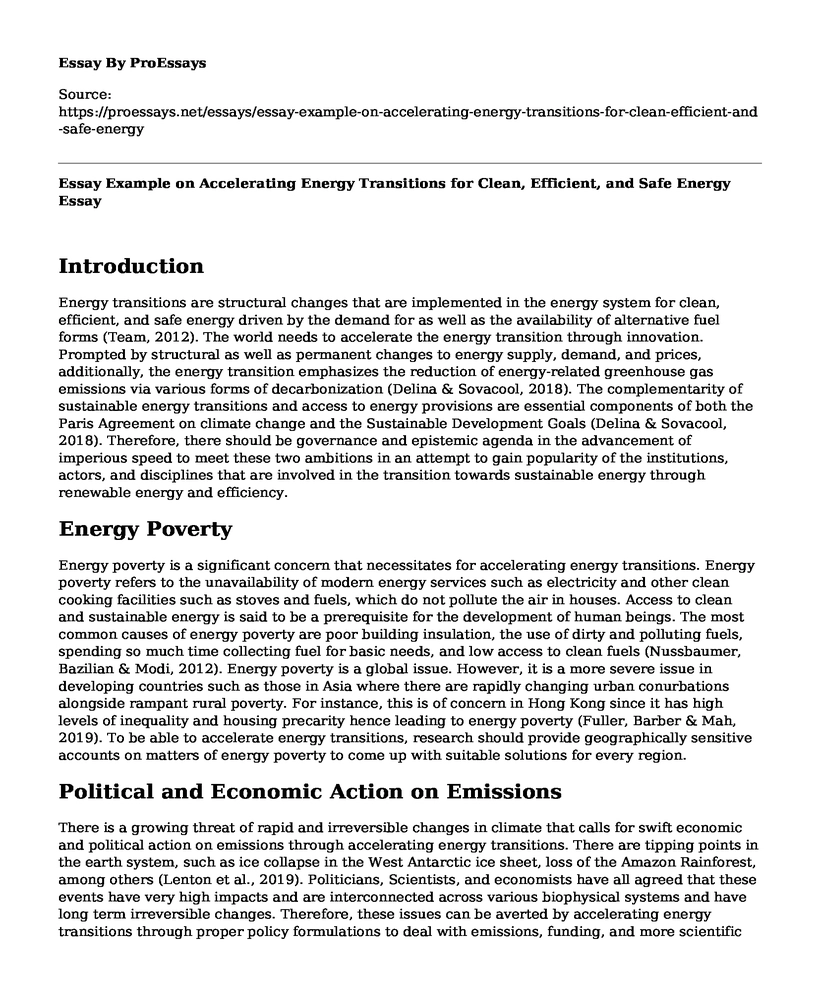Introduction
Energy transitions are structural changes that are implemented in the energy system for clean, efficient, and safe energy driven by the demand for as well as the availability of alternative fuel forms (Team, 2012). The world needs to accelerate the energy transition through innovation. Prompted by structural as well as permanent changes to energy supply, demand, and prices, additionally, the energy transition emphasizes the reduction of energy-related greenhouse gas emissions via various forms of decarbonization (Delina & Sovacool, 2018). The complementarity of sustainable energy transitions and access to energy provisions are essential components of both the Paris Agreement on climate change and the Sustainable Development Goals (Delina & Sovacool, 2018). Therefore, there should be governance and epistemic agenda in the advancement of imperious speed to meet these two ambitions in an attempt to gain popularity of the institutions, actors, and disciplines that are involved in the transition towards sustainable energy through renewable energy and efficiency.
Energy Poverty
Energy poverty is a significant concern that necessitates for accelerating energy transitions. Energy poverty refers to the unavailability of modern energy services such as electricity and other clean cooking facilities such as stoves and fuels, which do not pollute the air in houses. Access to clean and sustainable energy is said to be a prerequisite for the development of human beings. The most common causes of energy poverty are poor building insulation, the use of dirty and polluting fuels, spending so much time collecting fuel for basic needs, and low access to clean fuels (Nussbaumer, Bazilian & Modi, 2012). Energy poverty is a global issue. However, it is a more severe issue in developing countries such as those in Asia where there are rapidly changing urban conurbations alongside rampant rural poverty. For instance, this is of concern in Hong Kong since it has high levels of inequality and housing precarity hence leading to energy poverty (Fuller, Barber & Mah, 2019). To be able to accelerate energy transitions, research should provide geographically sensitive accounts on matters of energy poverty to come up with suitable solutions for every region.
Political and Economic Action on Emissions
There is a growing threat of rapid and irreversible changes in climate that calls for swift economic and political action on emissions through accelerating energy transitions. There are tipping points in the earth system, such as ice collapse in the West Antarctic ice sheet, loss of the Amazon Rainforest, among others (Lenton et al., 2019). Politicians, Scientists, and economists have all agreed that these events have very high impacts and are interconnected across various biophysical systems and have long term irreversible changes. Therefore, these issues can be averted by accelerating energy transitions through proper policy formulations to deal with emissions, funding, and more scientific research (DeCanio, 2009).
Energy Policy: Just Transition
One of the most used techniques in accelerating energy transitions is the concept of Just Transition. Just development refers to a modern structure of analysis that incorporated and intertwines energy, climate, and environmental justice (Healy & Barry, 2017). The original concept of this phrase was to help in linking the promotion of clean technology with the guarantee of green jobs. Due to the need for accelerated energy transitions, the Paris climate change agreement proposed for a world-wide recognition that a more speedy transition was required in averting catastrophic consequences and outcomes (McCauley & Heffron, 2018). Therefore, to be able to achieve positive results, climate, energy, and environmental justice efforts should be innovated to asses where unfairness will arise and come up with ways of tackling them. The concept of just transition bids a new space for evolving an interdisciplinary transition subtle method to exploring and promoting restorative, procedural as well as distributional justice.
References
DeCanio, S. J. (2009). The Political Economy of Global Carbon Emissions Reductions. Ecological Economics, 68(3), 915-924. Retrieved from: https://www.sciencedirect.com/science/article/abs/pii/S0921800908004655
Delina, L. L., & Sovacool, B. K. (2018). Of temporality and Plurality: An Epistemic and Governance Agenda for Accelerating Just Transitions for Energy Access and Sustainable Development. Current Opinion in Environmental Sustainability, 34, 1-6. Retrieved from: https://www.sciencedirect.com/science/article/pii/S1877343517302725
Fuller, S., Barber, L. B., & Mah, D. N. Y. (2019). Narratives of Energy Poverty in Hong Kong. Energy and Buildings, 191, 52-58. Retrieved from: https://www.sciencedirect.com/science/article/abs/pii/S0378778818322606
Healy, N., & Barry, J. (2017). Politicizing Energy Justice and Energy System Transitions: Fossil Fuel Divestment and a "Just Transition". Energy Policy, 108, 451-459. Retrieved from: https://www.sciencedirect.com/science/article/abs/pii/S0301421517303683
Lenton, T. M., Rockstrom, J., Gaffney, O., Rahmstorf, S., Richardson, K., Steffen, W., & Schellnhuber, H. J. (2019). Climate Tipping Points-Too Risky to Bet Against. Retrieved from: https://www.nature.com/articles/d41586-019-03595-0?fbclid=IwAR0axCO7TmkJ34bprB2948XqNQUXPr8tMX4VZjz4AC6dm_f7uvH37hUSMQo
McCauley, D., & Heffron, R. (2018). Just Transition: Integrating Climate, Energy and Environmental Justice. Energy Policy, 119, 1-7. Retrieved from: https://www.sciencedirect.com/science/article/abs/pii/S0301421518302301
Nussbaumer, P., Bazilian, M., & Modi, V. (2012). Measuring Energy Poverty: Focusing on What Matters. Renewable and Sustainable Energy Reviews, 16(1), 231-243. Retrieved from: https://www.sciencedirect.com/science/article/abs/pii/S1364032111003972
Team, G. E. A. W. (2012). Global Energy Assessment. Cambridge Books. Retrieved from: https://ideas.repec.org/b/cup/cbooks/9780521182935.html
Cite this page
Essay Example on Accelerating Energy Transitions for Clean, Efficient, and Safe Energy. (2023, Apr 24). Retrieved from https://proessays.net/essays/essay-example-on-accelerating-energy-transitions-for-clean-efficient-and-safe-energy
If you are the original author of this essay and no longer wish to have it published on the ProEssays website, please click below to request its removal:
- Course Work Sample: The Effects of Dissolved Oxygen on Fish Growth
- Electronic Waste (E-Waste): Time to Reduce, Reuse, and Recycle
- How Ecosystems Work Essay
- Essay Example on Vajont Dam: A Giant With Devastating Powers
- EPA: Working for Environmental Sustainability and Protection - Essay Sample
- Global Warming: Rising Temperatures, Floods, and Calamities Ahead - Essay Sample
- Paper Example on Urban Pollution and Lack of Sustainability: Impact on Transportation System







